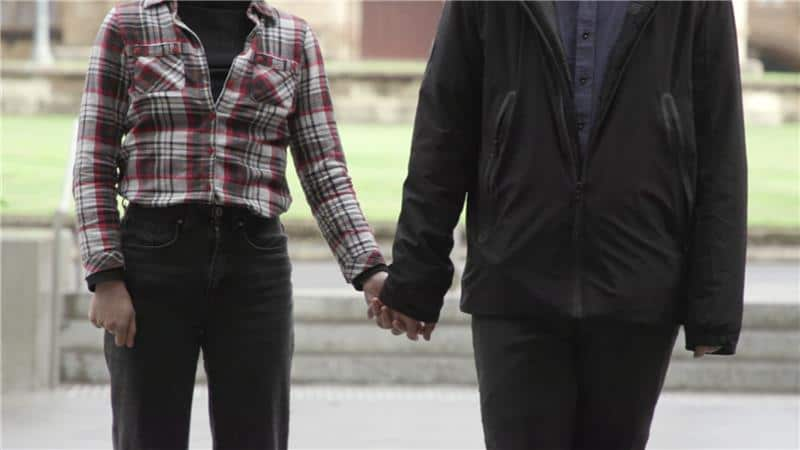Video above: Insight discovers what stereotypes exist that can make relationships complicated for bisexual people. Full ep. Tuesday July 20 at 8:30pm on SBS and On Demand.
Angle, 23, met Jocelin, 24, after she unknowingly responded to all three of his anonymous posts on the ‘USyd Love Letters’ Facebook page. The pair hit it off immediately, sharing a love of music, poetry and nature and both identified as non-binary and bisexual.
Angle - an international student from the Philippines who has called Australia home for the past three years - said it was important to him to reveal his sexuality early on.
“I thought it was quite important to bring that up on pretty much the first second because in my past relationships, I could feel that there was really some tension when you just don't mention it,” Angle said.
“And it feels like there's going be a problem when that comes up with someone who's straight.”
Angle said it’s made a huge difference having a partner who also identifies as bisexual.
“I think what makes me happy about our relationship is I can truly be who I am. I've struggled with that in past relationships,” Angle said.

When Angle was coming to terms with his gender and sexual identity he said he struggled to find psychological help that specialised in bisexuality.
“A few services were happy to take me on but mentioned they wouldn’t take me on as a LGBTQI+ patient as they wouldn’t be able to deal with my problems as opposed to others in the LGBTQI+ community.”
“I feel like there’s a high percentage of people in the bi community but we don’t get representation or support outside of it,” explained Angle.
In 2019 La Trobe University in Victoria conducted a study which examined why bisexual people experience higher rates of psychological distress than heterosexual and homosexual people.
Questioning more than 2,600 bisexual people across Australia, the aim of the Who I Am study was to uncover the reasons for poor mental health in bisexual people. The study found significant links between poor mental health and the following factors:
- Bisexual people who are in heterosexual relationships;
- Bisexual people perceiving their sexuality to be bad or wrong;
- Bisexual people thinking their partner’s support or understanding of their sexuality is low.
The study found significant statistics demonstrating the poor mental health of cisgender (where their gender is congruent with biological sex) bisexual people:
- One in four have attempted suicide
- Nearly 80 per cent had considered self-harm or thought about committing suicide
- Over 60 per cent have high or very high current psychological distress, with 40 per cent reporting having had depression in the past.
Research Officer Julia Taylor, who led the research from La Trobe’s Australian Research Centre in Sex, Health and Society (ARCSHS), said the study is proof that more support is needed to improve the mental health of bisexual people.
“Attraction to more than one gender is very common among Australian adults and most health practitioners are unaware of the very poor mental health associated with this group,” Mrs Taylor said.
“While there’s been an increased focus on lesbian and gay health in recent years, a substantial gap in knowledge specifically on bisexual health needs still remains.
“Through the Who I Am study, we wanted to address this gap and provide GPs and other health professionals with more information on bisexual mental health.”
I went to a Catholic grade school and they basically taught us that anything less than heteronormativity and heterosexuality is the devil’s work.
Jocelin – who was born in Hong Kong and moved to Sydney with her family when she was 7 years old - initially identified as lesbian in her teens. She then identified as bisexual in her early 20s. She said her mental health suffered most when marriage equality was being discussed in her Church.
“…members of my church felt this need to comment every week [on the marriage equality debate], it was very damaging because it felt palpable to me that people in my church were shooting down my identity, that I had no control over and that was something I had accepted as part of me,” Jocelin said.
Angle said his mental health deteriorated when he was in junior school.
“I went to a Catholic grade school and they basically taught us that anything less than heteronormativity and heterosexuality is the devil’s work,” he told Insight.
But since moving to Australia, Angle said his mental health has improved.
“I have that felt as though I was going to start my life here, I could be more open with myself,” he explained. “In terms of mental health I could sleep better at night, I felt like I could do more, I didn’t have concentration issues like I used to have when so many things were bothering me.
“So being able to even have that opportunity to be myself helped me breathe again. I definitely do see a few people who are still against LGBTQI+ here but it’s not as bad as if you lived in the Philippines.”
Insight is Australia's leading forum for debate and powerful first-person stories offering a unique perspective on the way we live. Read more about Insight
Have a story or comment? Contact Us


